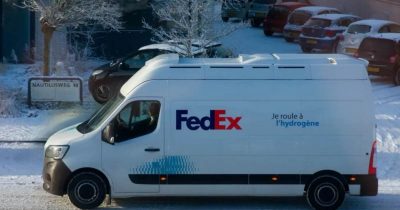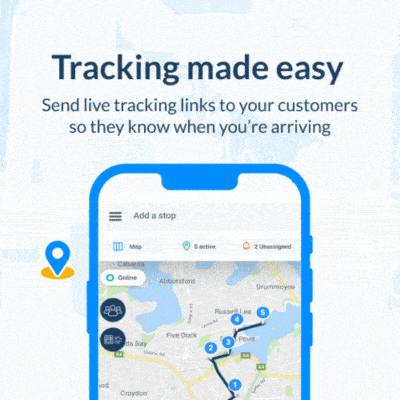FedEX Express Europe has started trialing a hydrogen-powered van for its pick-up and delivery operations in the Netherlands. This is the first time FedEx Express has tested this technology in Europe.
The vehicle being used for the pilot is a Renault Master Van H2-TECH. It is manufactured by HYVIA in a joint venture with the Renault Group and Plug.
Refuel in under five minutes for delivery
Features for the Renault Master Van H2-Tech include refueling done in under five minutes – with six kilograms of hydrogen gas, and an on-board 33kWh lithium-ion battery is recharged by the fuel cell while in use.
Marius Penninks, vice-president at FedEx Express Europe says, “It’s important to stay curious about solutions that can reduce our dependency on fossil fuels. This trial offers us first-hand experience using a vehicle of this type, an opportunity to hear from our drivers about the driving experience, and a chance to uncover any benefits or limitations of the technology in the context of a real-world logistics environment.”
HYVIA creates energy solution for delivery
The manufacturer of the hydrogen-powered van is a ‘green’ hydrogen mobility company, HYVIA aspires to clean and sustainable mobility. Julien Etienne, Chief Commercial Officer of Hyvia, says, “HYVIA is inventing a new hydrogen mobility offer, pioneering and reassuring mobility that brings value to professional customers engaged in the energy transition. We are proud to support FedEx Express Europe with this first hydrogen-powered vehicle pilot in the Netherlands.”
Doing business the sustainable way
FedEx is on a mission to achieve carbon-neutral operations by 2040. In January, FedEx Express announced that it partnered with Gaius Automotive to use electrical three-wheelers for commercial purposes for last-mile delivery and pick-ups in Taiwan.
In September 2023, FedEx Express Europe deployed 23 Mercedes-Benz eSprinter electric vehicles for its UK operations.
Hydrogen-powered vehicle for delivery
The Renault Group introduced the Renault Master Van H2-Tech in 2021, which has some pretty fast refueling speed.
The company explains the difference between an electric-powered car and one powered by hydrogen, “The electricity required to run the powertrain is not only supplied by the battery but also by the fuel cell using hydrogen stored onboard the vehicle. Most hydrogen vehicles currently produced by automobile manufacturers work in this way.
Massive growth for hydrogen fuel cell market
Allied Market Research reports the global hydrogen fuel cell market is estimated to grow at an annual compounded growth rate of 43% in the next eight years. “The key factors that drive the growth of the global hydrogen fuel cell vehicle market are an increase in environmental concern, government initiatives for the development of hydrogen fuel cell infrastructure and rise in investments for research and development activities,” reads the report.
Share this article
About the author
Sharl is a qualified journalist. He has over 10 years’ experience in the media industry, including positions as an editor of a magazine and Business Editor of a daily newspaper. Sharl also has experience in logistics specifically operations, where he worked with global food aid organisations distributing food into Africa. Sharl enjoys writing business stories and human interest pieces.













